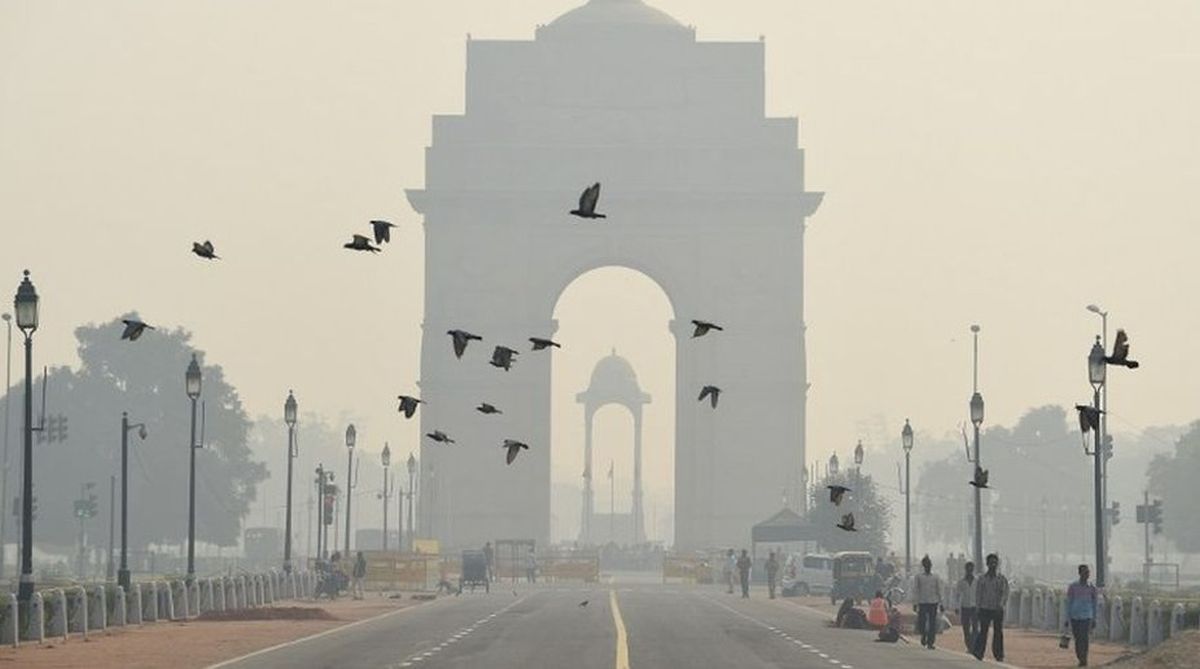‘We flushed out Chinese products from UP markets’: Yogi Adityanath
The Uttar Pradesh chief minister said this during a programme of the MSME Department held.
SAFAR had earlier said that there was a large possibility of an increase in moisture from Monday evening, which might lead to an increase in the pollution level.

(Photo: Getty Images)
People in Delhi woke up to a thick blanket of smog spread all across the national capital on Monday amid warnings by weather officials of falling air quality.
The air quality deteriorated with pollution level breaching the ‘hazardous’ category. The Air Quality Index (AQI) around Mandir Marg recorded PM 10 levels at 707 and PM 2.5 at 663. Jawaharlal Nehru Stadium and Major Dhyan Chand National Stadium recorded PM 10 levels at 681 and 676 respectively.
A thick layer of smog blanketed Rajpath early in the morning.
Advertisement
The Centre-run System of Air Quality Forecasting and Research (SAFAR) had earlier said that there was a large possibility of an increase in moisture from Monday evening, which might lead to an increase in the pollution level.
“The AQI is predicted to be in the lower range of very poor Monday as the atmosphere is relatively clean,” the official said.
In a short-lived relief, Delhiites breathed easy on Sunday after air quality significantly improved due to increased wind speed and control measures implemented by the government.
On Sunday, a total fine of Rs 83,55,000 was imposed on violators by the teams deployed to monitor implementation of measures to combat pollution in the Delhi NCR under the campaign.
The overall air quality index (AQI) on Sunday was recorded at 181, which falls in the ‘moderate’ category. In the morning it was 231, which falls in the ‘poor’ category, Central Pollution Control Board (CPCB) data said.
The improvement in air quality can be attributed to the increase in surface wind speed to five kmph. This flushed out pollutants, an official of the SAFAR said.
The reduction in base emission is also suggestive of a more pronounced effect of control measures taken by authorities, the official said.
On Friday, the AQI was 370, which came down to 336 on Saturday, according to the CPCB. It has been found that PM 2.5 emission reduced “from 432 ton per day to 370 ton per day to reproduce the observed level with realistic met parameters, a decline in base emission by 14 per cent in Delhi and nearby domain”, the official said.
PM 2.5 are particles in the air with a diameter of fewer than 2.5 micrometres.
The Indian Institute of Tropical Meteorology (IITM) said fire counts in the northwest region of India were significantly less on Saturday as compared to Thursday but warned of a sharp increase in PM2.5 concentration from Monday.
“If significant stubble burning continues on Sunday and Monday in the NW (northwest) region of India then its impact is very likely over Delhi and AQI may reach the upper end of the very poor category.
“The northwest wind direction may bring the influence of biomass fire on Tuesday and Wednesday,” the IITM said.
Delhi authorities have stepped up efforts to combat pollution which includes measures like halting construction activities and regulating traffic.
There is a halt on all construction activities involving excavation. Civil construction has also been suspended in Delhi and other NCR districts, besides closure of all stone crushers and hot mix plants generating dust pollution.
The Delhi Pollution Control Committee (DPCC) has also directed the Transport Department and the Traffic Police to intensify checking of polluting vehicles and control travel congestion in the region during November 1-10.
An aggressive 10-day-long ‘Clean Air Campaign’ from November 1 to 10 has also been launched to monitor and report polluting activities as well as to ensure quick action.
Based on 368 complaints, a total fine of Rs 83,55,000 was imposed on Sunday itself by 52 teams in the national capital, said the CPCB.
It said a total of 119 complaints of construction and demolition activities were received.
Other complaints included that of vehicular emission, traffic congestion, industrial emission, open or garbage burning, leaf burning, road dust, unpaved road, fire in landfill sites, air pollution from generators among others, the CPCB said.
It said a total of 52 complaints were received through social media and e-mail while 316 complaints through the ‘Sameer app’ that has been developed by the CPCB.
Officials said about 43 teams attended to 248 complaints in Delhi. Two teams attended to 11 complaints in Gurgaon, two teams to 31 complaints in Faridabad and two teams to five complaints in Noida and Greater Noida. Three teams attended 21 complaints in Ghaziabad.
On Friday and Saturday, a total penalty of Rs 80 lakh was imposed on violators.
The teams are visiting different parts of Delhi and adjacent towns of Faridabad, Gurgaon, Ghaziabad and Noida.
Delhiites welcomed the improvement in the air quality which has been severe for the last three weeks.
D Saha, former additional director and head of air quality management division at the CPCB, said, “No drastic change in pollution level is anticipated as the ground level emissions are under control due to various administrative and regulatory measures, and we are likely to have a clean Diwali.”
(With PTI inputs)
Advertisement